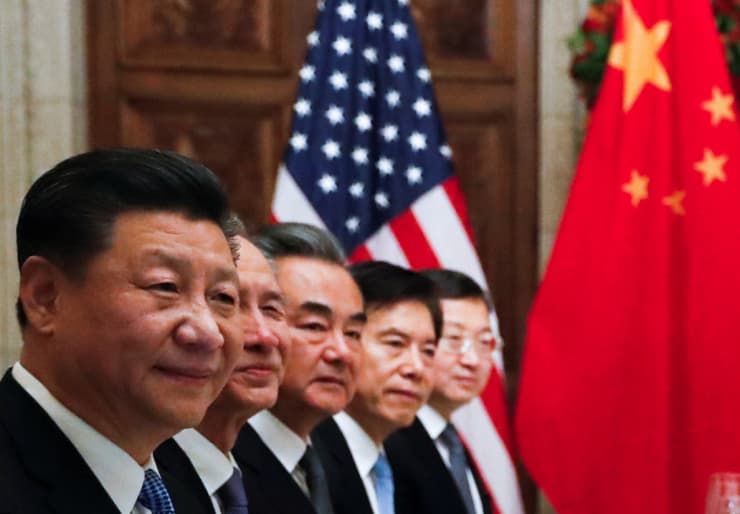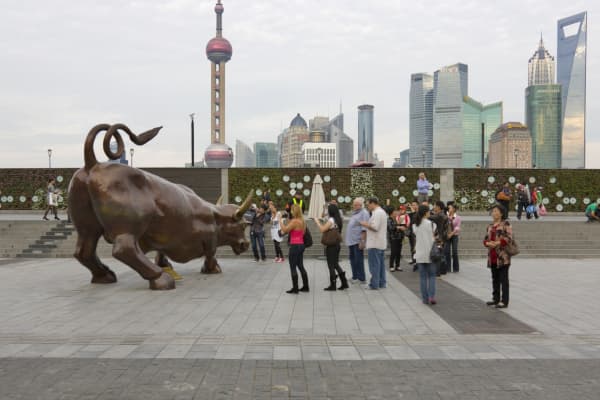- The Dow is down about 1,200 points since President Donald Trump announced tariff hikes last week, with heavier losses in companies with business in China.
- Intel, Apple and Caterpillar have all dropped more than 10% in the six trading days since the president’s tweet on May 5.
- Intel in particular is vulnerable to a deterioration in U.S.-China trade relations, which about 25% on its sales coming from China.

Chinese dictator Xi Jinping and members of Chinese delegation attend a working dinner with U.S. President Donald Trump after the G20 leaders summit in Buenos Aires, Argentina December 1, 2018.
Losses amid the nation’s blue-chip Dow stocks are starting to show Wall Street’s concerns for companies with significant exposure to the Chinese market.
While the Dow Jones industrial average is down 1,180 points — more than 4% — since President Donald Trump announced last week an increase to tariffs on Chinese goods, the decline has been concentrated among a select few equities.
Intel and Apple have both dropped more than 10% in the six trading days since the president’s tweet on May 5, when he said that levies on $200 billion of imported goods from China would climb to 25% from 10%.
Caterpillar is down more than 8% since.
Beijing responded in kind on Monday, saying it would hike taxes on $60 billion worth of U.S. imports, starting on June 1.
.1557777945629.png)
Intel in particular may be vulnerable to a deterioration in U.S.-China trade relations, with about 25% of its sales coming from China, according to FactSet data.
Beijing responded in kind on Monday, saying it would hike taxes on $60 billion worth of U.S. imports, starting on June 1.
.1557777945629.png)
Intel in particular may be vulnerable to a deterioration in U.S.-China trade relations, with about 25% of its sales coming from China, according to FactSet data.
China represents about 18% of revenues for Apple and 5% for equipment and machinery giant Caterpillar.
Intel fell 3.1% Monday, while Apple dropped 5.8% and Caterpillar lost 4.6%.
Since May 3, Apple’s value has sunk $119.77 billion, Intel is down $31.29 billion and Caterpillar has lost $7.87 billion for a summed loss about the same size as the McDonald’s fast-food empire.
Global aircraft manufacturer and U.S. industrial gem Boeing also slid to start the week, down 4.8% on Monday.
Intel fell 3.1% Monday, while Apple dropped 5.8% and Caterpillar lost 4.6%.
Since May 3, Apple’s value has sunk $119.77 billion, Intel is down $31.29 billion and Caterpillar has lost $7.87 billion for a summed loss about the same size as the McDonald’s fast-food empire.
Global aircraft manufacturer and U.S. industrial gem Boeing also slid to start the week, down 4.8% on Monday.
The equity is underperforming the Dow in 2019 thanks to concerns over two fatal crashes involving its 737 Max plane.
It also generates about 13% of its total sales from China.
Other Dow-component laggards in recent days include United Technologies, Cisco Systems, 3M and Goldman Sachs, one of the largest investment banking companies in the world.
Boeing, Caterpillar, 3M, Goldman Sachs and Apple fell into bear market territory Monday, joining Intel and Walgreens Boots Alliance with more than 20% declines from recent highs.
Meanwhile the insurer UnitedHealth Group, a largely domestic business not beholden to the global economy, is still in the green.
Other Dow-component laggards in recent days include United Technologies, Cisco Systems, 3M and Goldman Sachs, one of the largest investment banking companies in the world.
Boeing, Caterpillar, 3M, Goldman Sachs and Apple fell into bear market territory Monday, joining Intel and Walgreens Boots Alliance with more than 20% declines from recent highs.
Meanwhile the insurer UnitedHealth Group, a largely domestic business not beholden to the global economy, is still in the green.
